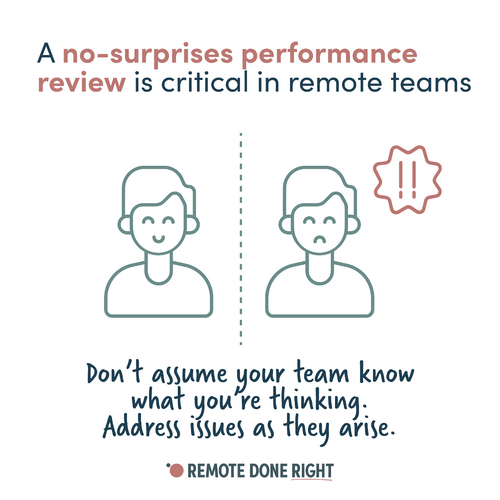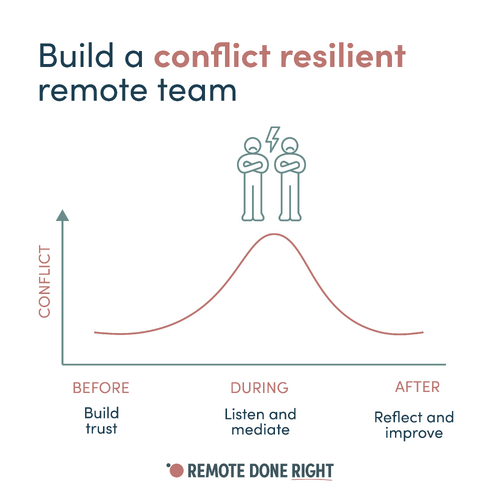Articles
Equity
Aim for a no-surprises performance review.
Regular performance conversations are critical in a remote environment.
Navigating the complexities of managing remote teams can be made simpler by setting clear performance expectations, measuring productivity effectively, and providing constructive feedback.
Set clear performance expectations
The importance of clarity in expectations cannot be overstated when managing remote teams. Without face-to-face interaction, it's easy for misunderstandings to occur, leading to decreased productivity …
Team conflict is inevitable, setting clear expectations and open lines of communication in your remote team can help address it.
Identify the sources of conflict
Conflict in remote teams can arise from various sources. Recognising these sources is the first step towards addressing and resolving them effectively.
- Communication breakdowns: misunderstandings often occur due to the lack of face-to-face interaction. Text-based communication can lead to misinterpretations.
- Cultural differences: diverse teams bring different cultural perspectives, which can sometimes clash if not managed properly.
- Unequal workload distribu…
Why can't I just have a blanket rule for remote work?
The temptation to implement a blanket rule for all hybrid or remote workers is driven by the desire for simplicity and uniformity. Leaders face the challenge of designing flexible work arrangements that maintain productivity while addressing the diverse needs of their teams.
Why it matters
Fairness in the workplace means recognising and accommodating diversity, ensuring that every employee has the support they need to thrive. Uniform policies can lead to employees feeling undervalued and less …
Create the perfect remote work plan: A leader's guide
Teams need to collaborate and compromise on remote work arrangements to come up with a plan that works for everyone.
Why it matters
Remote work is no longer a temporary solution. Without a thoughtful operations plan, distributed teams can quickly become disjointed, leading to miscommunication, unmet deadlines, and ultimately, dissatisfied employees. Effective remote work planning isn't just a logistical necessity; it's a strategic imperative that ensures the work gets done and people remain ha…
Don’t ask how many people are in the office. Ask is the job getting done.
If you lead a team that’s successfully working from home, but you’re facing the scrutiny of senior leaders who want everyone back in the office, make sure you’re giving them evidence that the work is getting done, your people are happier and you have the capacity to resolve issues.
Why it matters
Maintaining remote work means getting senior leaders on board. If you keep them in the dark about your successes, they don’t have all the information they need to make decisions about the future of re…
Mastering work-life balance: essential tips for remote teams
Remote work is blurring the lines between home life and work life.
Why it Matters
The wellbeing of your team should be your number one priority. Recognise and address the signs of an unhealthy work / life balance before your team burn out.
Take Action
Help support your remote team to achieve balanced and fulfilling work:
- Set boundaries between work and personal life
Without a clear boundary, employees may find themselves working longer hours, leading to burnout and decreased productivity.…
Managing outcomes rather than actions
The shift to remote work requires a rethink of management style. Traditionally, managers might have focused on the specific process employees follow to complete tasks. However, this can lead to micromanagement and distrust, particularly in remote settings where direct oversight is difficult. Instead, by clearly communicating desired outcomes to their teams, leaders can empower team members to use their expertise to determine the best ways to achieve those outcomes. This approach fosters trust, e…
Get across it: the rise of bossware and employee monitoring
Employee monitoring software is becoming increasingly popular. But research shows that keeping such a close eye on employees can reduce rather than boost engagement, productivity, and worker retention.
What is bossware?
Bossware is a catch-all term for employee monitoring software.
This software is designed to measure an employee’s productivity during a workday by tracking some or all of the following:
- Mouse movements;
- Keystrokes;
- Internet browsing history;
- Visibility of employee throug…
The return to office: a leadership mirage
As companies summon their employees back to the office, reality looms: physical proximity won't magically repair fractured leadership dynamics. Leaders who struggled to connect and inspire their teams remotely are likely to find themselves grappling with the same challenges within office walls.
Why it matters
While there are legitimate reasons for wanting employees back in the office, such as fostering collaboration, maintaining company culture or ensuring effective communication, it’s importa…
The Bossware Boom: Should you be monitoring employees?
Surveillance software is on the rise among employers looking to track the productivity of their remote workers— but research shows that monitoring is not an effective substitute for good management.
Why it matters
With remote work here to stay, it’s essential to consider how to keep an eye on employees who are out of sight.
Employee monitoring software has been widely accepted as a solution. As early as 2020, almost 60% of small-to-medium businesses in Australia used employee monitoring softw…










